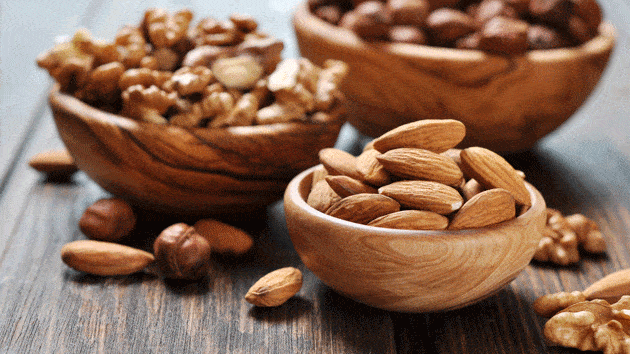
The finding that eating nuts is associated with improved survival in patients with colorectal cancer (CRC) is making headlines again.
The finding comes from an observational study of patients with stage III colon cancer who were treated with surgery and adjuvant chemotherapy. For those patients who recalled eating two servings of nuts per week, disease-free survival (DFS) and overall survival (OS) were significantly extended compared to those who had not consumed any nuts.
Interestingly, the association was significant only for eating tree nuts, which include almonds, walnuts, hazelnuts, cashews, and pecans.
Peanuts are in the legume family, and although there was a trend toward improved outcomes with peanuts, it was not statistically significant.
The study was published online February 28 in the Journal of Clinical Oncology. It was previously presented in 2017 at the annual meeting of the American Society of Clinical Oncology, as reported at the time by Medscape Medical News.
ASCO President Daniel Hayes, MD, said at the time: “Basic healthy eating can often be overlooked during cancer treatment. This study shows that something as simple as eating tree nuts may make a difference to a patient’s long-term survival.”
Study Details
The study was conducted in 826 patients with stage III colon cancer who had taken part in the adjuvant chemotherapy CALGB 89803 (Alliance) clinical trial.
Patients completed a semiquantitative, 20-page food frequency questionnaire, and total nut intake was calculated as the weighted proportional summation of both tree nuts and peanuts.
After a median follow-up of 6.5 years, patients who consumed at least two 1-oz servings of any type of nuts per week had a 42% improvement in DFS (hazard ratio [HR], 0.58; P = .03) and a 57% improvement in OS (HR, of 0.43; P = .01).
“Further analysis of this cohort revealed that disease-free survival increased by 46% among the subgroup of nut consumers who ate tree nuts rather than peanuts [HR, 0.54; P = .04],” senior author Charles Fuchs, MD, director of Yale Cancer Center in New Haven, Connecticut, said in a statement.
OS was 53% longer in the same subgroup of tree nut consumers than in those who did not eat tree nuts (HR, 0.47; P = .04), the investigators observe.
What Is It in Nuts?
“The association of total nut intake with improved outcomes was maintained across other known or suspected risk factors for cancer recurrence and mortality,” the study authors report.
They note that nutrients in nuts, such as unsaturated fatty acids, fiber, vitamins, and minerals, may provide anticarcinogenic and anti-inflammatory properties that could favorably affect outcomes in CRC patients.
They also hypothesize that nuts may have beneficial effects on hyperinsulinemia and energy balance, thereby improving patient outcomes as well.
“What we found was that patients who regularly ate nuts had a significantly higher rate of cure, they had a lower risk of the cancer coming back, and a greater survival, and we found this really consistently throughout the study,” Fuchs said in an interview with the journal.
The authors caution that the findings from their observational study do not prove that nuts improve CRC outcomes; rather, they further support previous observations that a healthy diet and lifestyle can benefit patients with CRC.
“These findings are in keeping with several other observational studies that indicate that a slew of healthy behaviors — including increased physical activity, keeping a healthy weight, and lower intake of sugar and sweetened beverages — improve colon cancer outcomes,” lead author Temidayo Fadelu, MD, a postdoctoral fellow at Dana-Farber Cancer Institute in Boston, Massachusetts, said in a statement.
“The results highlight the importance of emphasizing dietary and lifestyle factors in colon cancer survivorship,” he added.
